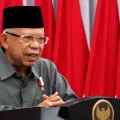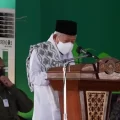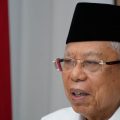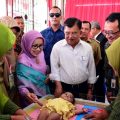Jakarta, wapresri.go.id – The government is aggressively trying to reduce the prevalence of stunting with a target of 14 percent in 2024. One of the strategies is a behavior change campaign to prevent stunting which requires the involvement of all elements of the nation, individuals, groups, and religious communities.
In this case, Muslims as the majority population of the Indonesian nation are considered to have great potential for this stunting prevention campaign. Moreover, one of the global surveys placed Indonesia as the 7th most religious country in the world, so this feature increases the opportunity to educate the public through a religious approach.
To that end, the role of religious leaders, leaders of Islamic community organizations, religious instructors, da’i, and dai’yah (preachers), as transmitters of spiritual values and messages in the community as well as being a source of knowledge (manbaul ‘ulum), educators ( murabbi), mover (muharrik), and role model (uswatun hasanah) for the people, become very strategic.
“I think the role of da’i, da’iyah, and religious instructors is very vital because they are present directly in the community. Sermons, lectures, and tausiah can be an effective educational media to transmit messages of kindness to the people, including education on the dangers of stunting and how to prevent it,” said Vice President KH Ma’ruf Amin as the Chair of the Steering Team for the Acceleration of Stunting Reduction (TP2S) when opening the National Halaqoh for Involvement of Religious Instructors, Da’i, and Da’iyah to Support the Acceleration of Stunting Reduction, at the Vice President’s Palace, Jalan Medan Merdeka Selatan Number 6, Thursday morning (06/10/2022).
Furthermore, the Vice President outlined da’wah messages regarding stunting prevention that could be conveyed by the preachers. First, said the Vice President, an invitation to live clean and healthy by keeping the house and environment clean, including not littering.
“Cleanliness is part of faith. This must be cultivated,” he pleaded.
The second, continued the Vice President, was an invitation to consume nutritious food, especially for pregnant women, breastfeeding mothers, and babies aged 2 years. According to him, this had also been taught in the Qur’an Surah Al-Baqarah verse 168.
“Good nutritional intake is the key to growth and development so that the children avoid stunting,” said the Vice President.
Third, the Vice President urged parents to provide good care for their children.
“Parenting in the family is one factor that shapes the character and quality of Indonesian people in the future,” he said.
Fourth, the Vice President emphasized the importance of exclusive breastfeeding for 6 months, complementary foods for breastfeeding after 6 months, and consumption of blood-added tablets for young women, brides-to-be, and pregnant women.
“Furthermore, marriage must also be carried out by a couple of mature age, physically, psychologically, spiritually, and economically, which is at least 19 years old according to the provisions of the Act [of the law].”
The Vice President explained that the consideration of these provisions did not lie in whether or not they may, but considering the benefit.
“So, the considerations used to delay [the marriage] are to take the most beneficial. Despite the possibility, if it is not beneficial, we must avoid it,” added the Vice President.
On the same occasion, the Vice President asked religious instructors, da’i, and da’iyah to invite the public in a wise and educational way (al-mau’idhatul hasanah), with polite speeches (qaulan layyina), and a good example (al-uswatul hasanah) as an effort to prevent stunting to prepare quality Indonesian people.
“Hopefully, through the calming da’wah from the da’i, da’iyah, and religious instructors, public awareness and concern for stunting will increase, to realize the goal of creating a young generation of a nation that is healthy, intelligent, superior, and competitive,” he concluded.
In line with the Vice President, Minister of Religion Yaqut Cholil Qoumas welcomed the implementation of this activity as a part of carrying out religious orders to prepare the golden generation of the Indonesian nation.
“Religion commands us not to leave a weak generation and, instead, we must prepare the best generation. Therefore, this activity is a variable that cannot be separated from the preparation of the future leaders of the country,” said Yaqut.
Meanwhile, the Head of the National Population and Family Planning Agency (BKKBN) as the Chief Executive of TP2S Hasto Wardoyo expressed his gratitude for the strategic support of involving religious instructors, and preachers in educating the public about stunting.
“We believe, through the national halaqoh with the ulama, da’i, da’iyah, and all levels of religious instructors throughout Indonesia, God willing, the acceleration of stunting reduction by increasing knowledge to the public will be achieved more quickly,” said Hasto.
For information, the National Halaqoh was held in a hybrid manner. The offline participants consisted of 24 representatives of the Religious Extension Working Group (Pokjaluh) and Heads of Regional Offices of the Ministry of Religion from 12 priority provinces to accelerate stunting reduction as well as leaders of representatives of Islamic organizations at the central level. The participants who attended online were more than 25 thousand religious instructors, da’i, da’iyah, head of the Office of Religious Affairs, Regional Offices of the Ministry of Religion, and Regional Offices of BKKBN throughout Indonesia, as well as representatives from ministries/institutions.
Present to accompany the Vice President during the event were the Deputy for Human Development Policy Support and Equality Development Suprayoga Hadi, Deputy for Government Policy Support and National Insight Velix Vernando Wanggai, and the Vice President’s Special Staff Muhammad Imam Aziz. (DMA/LHS BPMI-Setwapres)







